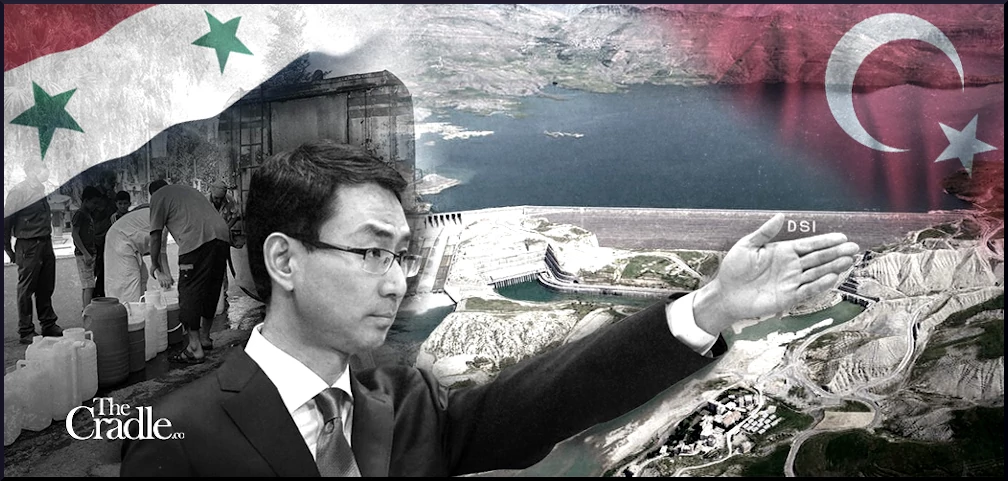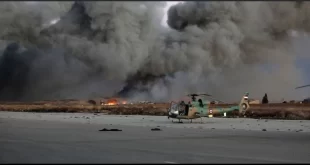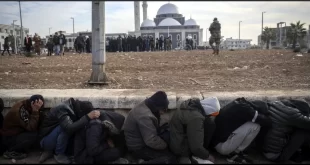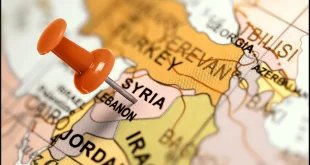by Erman Çete published on The Cradle, August 22, 2022
On 27 October 2021, China’s Deputy Permanent Representative to the UN Geng Shuang made an unexpected statement about Turkey and its role in Syria at a UN Security Council Briefing on Syria.
Shuang blamed Turkey for “illegally invading northeastern Syria” and “cutting off the water supply service from the Alouk water station” which is located in Al-Hasakah and is a critical water source for nearly 600,000 residents.
Shuang’s accusation mirrored what the Syrian government has been complaining about for decades, and some Kurdish groups in recent years. The water source disputes between Turkey on the one hand, and Syria, Iraq (and more recently Iran) on the other, have been one of the most pressing security problems in this part of West Asia.
A history of dispute
In 1923, Allied powers and the newly-established Republic of Turkey signed the Lausanne Peace Treaty. Included in the Treaty is a clause on the Euphrates and Kuveyk Rivers and a provision that Turkey must consult neighboring Iraq before undertaking any hydraulic works.
However, the problem arose with the Turkish Keban Dam project in 1964. As a result of the hydroelectric dam’s construction – the first major one to be built on the Euphrates – both Iraq and Syria raised concerns about the river’s water levels diminishing.
Later, in 1976, three countries cut a deal on the Karakaya Dam project, and Turkey agreed to release 500 cubic meters per second of water from the Euphrates. But during the 1990s, Iraq and Syria claimed that this volume was not sufficient and asked Turkey to raise the water volume to 700 cubic meter per second.
The Turkish mega irrigation and hydraulic energy project, Southeastern Anatolia Project (Turkish acronym, GAP), is still plaguing both countries. Turkey began the project in the 1970s with 19 hydraulic power plants (14 of them on the Euphrates), and in the 1990s it transformed into a largely political project, affecting the Kurdistan Workers’ Party (PKK) and Syria.
In 1990, for a whole month, Turkey held back the waters of the Euphrates to fill the Atatürk Dam. Baghdad and Damascus reacted sharply to the action, accusing Ankara for using the water of the Euphrates for political purposes.
Turkey’s position on the Euphrates and the Tigris is that these rivers are “transboundary,” meaning that they are rivers that cross at least one political border. Therefore, Ankara sees the two rivers as a uniform basin and part of its sovereignty.
Iraq and Syria, on the other hand, view the two rivers as “international” and separate entities. Seeking a diplomatic solution, Turkey tried to alleviate the political backlash in the 1980s by establishing joint committees with Iraq and Syria to deal with the issue.
Weaponization of water
Turkey consistently rejects the claim that it has been using the water sources as a political weapon. However, there are some gaping holes in this narrative.
After a joint security agreement with Syria, former Turkish Foreign Minister Hikmet Çetin insisted that Turkey’s commitments were conditional on Syria’s loyalty to the agreement.
In 1987, then-President Turgut Ozal threatened Damascus with severing access to the Euphrates if the latter continued to support the PKK, which Ankara, along with the US and the EU, consider a terrorist organization.
In one case, the absurdity prevailed. Adopting the legal doctrine of absolute territorial sovereignty, the then-Turkish President, Süleyman Demirel declared that “Turkey’s resources are Turkey’s. The oil resources are theirs (Arabs’). We do not say we share their oil resources; and they cannot say they share our water resources.”
More than just water
According to a 2002 report by a fact-finding mission for Turkey’s Ilisu Dam, contrary to Turkish claims that it was providing 500 cubic meter per second of water to its neighbors, Jarablus River’s water flow decreased to around 300 cubic meter per second.
Although Turkey rejects the claim that it controls the waters of the Euphrates and the Tigris at the expense of Iraq and Syria, the problem between the riparian states doesn’t just concern water levels and access.
Disposal of industrial and municipal waste into the rivers is one of the main complaints of downstream nations such as Iraq and Syria. Salinity in both the Euphrates and the Tigris has significantly increased in the 2000s.
According to a 2013 UN report, total dissolved solids (TDS) was about 300 parts per million (ppm) at Atatürk Dam on the Euphrates, and it increased to 600 ppm at the Syrian–Iraqi borders – much higher than the recommended TDS concentration for irrigation use.
After the Syrian War
Today, Syrian water sources can be divided along three areas of control: under the Syrian government, Turkish-backed jihadist factions, and the US-backed “autonomous government.”
In May 2014, Ankara began to gradually reduce the flow of Euphrates water over six days. The result was a reduction of 1.6 billion cubic meters in Lake Assad and the nearby hydroelectric power station, cutting back on its operation of eight turbines down to three.
Turkish academic Ozkan Gokcan has pointed out that the UN, the Syrian government, and the Kurdish factions have blamed Turkey for holding back the waters of the Euphrates. According to Gokcan, one aspect of decreasing water levels is related to soaring temperatures.
However, he thinks that the water problem is clearly also a political tool in Turkey’s hands. “An important milestone in this regard was the SDF’s control of the Teshrin Dam in 2015. The taking of Teshrin Dam has a symbolic meaning,” he claims, due to the Kurdish-led Syrian Defense Force’s (SDF) success on the western bank of the Euphrates. Turkey for its part drew a “red line” on the SDF’s ability to cross the western bank of the Euphrates.
Lebanese researcher Mohamad Hasan Sweidan says that Turkey has geopolitical goals in Syria and is trying to control the cities that border the two states. “Weakening the Syrian government is one of the main goals of Turkey in Syria, and Syria is dependent on the Euphrates for irrigation and potable water,” Sweidan argues.
Sweidan suggests another reason:
“Today, Turkey is a rising power in the region, which makes it in constant need to consolidate its economic, military and demographic position. This creates a growing need to enhance the infrastructure and sustainable energy supply in the country, in order to serve its growing economy and population.”
Israeli interests
On 4 March, 2004, Israel and Turkey signed an agreement whereby Turkey would sell the water of the Manavgat River to Israel. Welcoming the development, Israel’s then Undersecretary at the Ministry of Foreign Affairs Yoav Biran said “This is not just an economic deal. It has strategic, political and diplomatic significance. For the first time, a country sells water to another country.” The sale of Turkish water to Israel, however, failed.
Irrigation and water sources are key security elements for the Zionist ideology. The Zionist delegation to the post-WWI Versailles peace conference (1919-1920) lobbied in favor of including the entire watershed of the Jordan and Yarmouk rivers within the borders of the proposed national home for Jews in Palestine. The Zionist leaders also demanded the lower section of the Litani River in southern Lebanon.
As agriculture and the control of watercourses are critical for the survival of the state of Israel, water and politics inevitably merged with geopolitics. Equally, controlling the water sources as an occupying entity is critical for Israel.
Former Prime Minister Ariel Sharon once claimed that the Six-Day War did not start in 1967, but began two and a half years earlier, when Israel made a decision to act against the diversion of the Jordan River (after the Arab League initiated The Headwater Diversion Plan).
The recent improvement in diplomatic ties between Israel and Turkey gives rise to their possible joint efforts to ensure Syria remains a weak state, deprived of basic resources.
According to Sweidan, Turkish and Israeli interests converge in Syria. “Although no material evidence is found on the collusion between the two parties, taking a look at the history of the relation between Israel and Turkey, their ambitions and goals in the region, and their interests in Syria and its resources, one can suggest their [logical] collusion,” he claims.
Gokcan agrees that while tangible evidence of collusion between Israel and Turkey on water issues falls short, “when we look at the current situation, Turkey and Israel already have a say in the water sources that feed the Syrian lands by reducing the waters of the Euphrates and by keeping the Golan Heights under occupation.”
“Therefore, the collusion is not something hidden,” he adds.
Water as a pillar of national security
Other than the economy, the most heated domestic issue in Turkey is the refugee question. Both the government and the opposition now openly discuss the repatriation of Syrian refugees back to their country.
But it seems that natural causes such as drought, and Turkey’s water policy, complicate the issue.
According to a report by the UN Office for the Coordination of Humanitarian Affairs, “since April/May 2021, the humanitarian situation in northeastern Aleppo as well as Deir Ezzor, Al-Hasakah and Al-Raqqa Governorates has deteriorated further due to significantly reduced water availability and access.”
Water sources have become a lifeline for national integrity, too. A potential Turkish military operation in the Tal Rifaat region could critically impact the supply of water Aleppo, Syria’s largest industrial city. Turkish officials claim that capturing Tal Rifaat would facilitate the return of the Syrian refugees.
Gokcan stresses that the water sources are national security assets in West Asia: “It is quite possible that there will be more water-related tensions and conflicts between Middle Eastern states in the near term”.
As Turkey’s ambitious goals towards the region and water scarcity continue, we are likely to see more conflicts – and even wars – emerge over water sources.
 Syria Support Movement solidarity with the Syrian people
Syria Support Movement solidarity with the Syrian people





